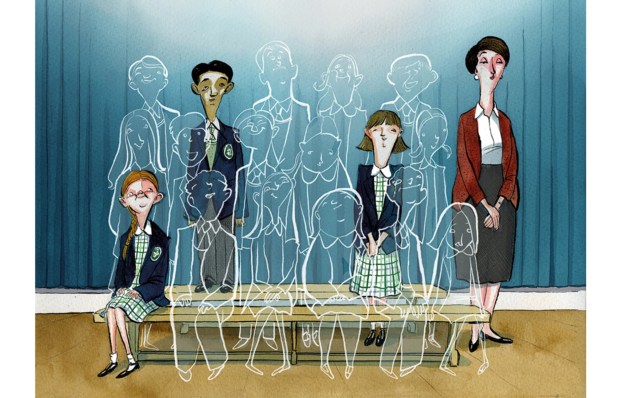Memories of drought
Sir: I read your leading article with interest as I well remember the hardship caused by the drought of 1976, particularly to the farmers and the tourist industry (‘Troubled water’, 28 July).
I was a director of the South West Water Authority and was deputed to issue drought orders, which included hosepipe bans. The privatised company to which I had been appointed to the board then built Roadford Reservoir, which has a huge capacity, and the company has never had to impose restrictions since.
I agree that the industry is far from satisfactory. The companies, particularly Thames Water, found it cheaper to allow leaking pipes than to repair them. There is also the question of the exorbitant salaries of certain chief executives. But if a future Labour government renationalised water, this would cause chaos. Meters should be imposed on all domestic properties and competition should be allowed in the market. I firmly believe that to take the industry back into the public sector would be a very retrograde step.
Sir Simon Day
Ivybridge, Devon
Pandering to children
Sir: A couple of days before reading Cosmo Landesman’s article ‘Problem children’ (28 July), which talked about how children are now allowed to run amok in child-centric Britain, I visited the National Trust’s Croome Estate in Worcestershire. The estate is home to St Mary Magdalene Church, which is under the care of the Churches Conservation Trust.
Laminated notices for children were attached to the pews and I quote from one: ‘In the past, people were expected to behave in certain ways in church; this meant sitting sensibly in a pew or walking with a good posture. Be mischievous and lie down here! … Take a mischievous selfie and tweet us at the CCT.’ Another notice suggested that they boogie up the aisle. The torn pages in the Bible on the pulpit would suggest that the CCT’s nutty recommendation was acted upon. What is the point of pandering to children in this way?
Judith Riches
Wellington Heath, Herefordshire
Paper preference
Sir: Robert Plumb extols the virtue of an electronic subscription (Letters, 28 July). He fails to remind us that an electronic copy of the magazine requires a huge amount of electricity to run internet servers, the air conditioning for the servers, and the consumers’ computers, to say nothing of the environmental cost of finding and disposing of the lithium used in batteries that power tablets.
Nor does he claim that the electronic copy of the Speccie can be comfortably read in a bath, at the side of a pool, on the loo, on a train, on a wifi-free holiday or without access to electricity. As someone who has to use a screen for a great deal of my work, I’d always prefer a paper copy of any subscription, paper or book, as I can scan pages, refer backwards or forwards easily, and skip pages as required. However, I do agree with Mr Plumb that a paper copy would be improved by being delivered in a biodegradable envelope.
Ben Hughes
Norfolk
How I’d vote again
Sir: I completely agree with David Harris (Letters, 28 July). Like him a Remain voter and a Londoner, I was utterly shocked by the result of the referendum, spending some hours trawling the online results in an attempt to understand what had happened. It was a salutary experience, yielding many surprises (Sevenoaks voted out!) and forced me to reappraise my initial generalised assumptions about the vote. We on the Remain side lost, and fairly.
Since then I have been so angered and repelled by the behaviour of Messrs Juncker and Barnier that should we be obliged to vote again I will vote to Leave.
Averil Burgess
London N6
New care homes needed
Sir: Sarah Whitebloom’s article focused mainly on the quality of nursing care in care homes, but I think we should also look at the buildings (‘Who cares about care homes?’, 28 July). In North Wales lots of care homes have closed for financial reasons and many of the rest are in converted Victorian rectories, seaside guest houses or country mansions. These are not the best places to look after frail, confused or sick people. The worst are grim, unwelcoming and smelly, with bedrooms which would embarrass a cheap hotel.
After the Grenfell disaster the Welsh government ordered all residential NHS facilities to have new fire safety inspections. Our local health board shut one ward in our 19th-century community hospital because the fire brigade questioned its safety. I have not heard that our nursing homes have been looked at in the same way. Are care homes required to meet the same safety standards as NHS hospitals?
Shiny new supermarkets seem to be springing up all over the place, but what we really need are new care homes.
Dr J.C. Madoc-Jones
Denbigh, Wales
The story of Jock
Sir: I have to disagree with Boris Johnson’s comment (Diary, 28 July) from an American publisher that books on Churchill and cats never fail. When I worked for the National Trust, I wrote a children’s story about Churchill’s cat, Jock, a descendant of which has always resided at Chartwell. The print button was just about to be pressed when Mary Soames objected and the Trust, always reluctant to offend its donors, pulled it. I still have it in a drawer!
Sheila Mortimer
Cuckfield, West Sussex
Got something to add? Join the discussion and comment below.
Get 10 issues for just $10
Subscribe to The Spectator Australia today for the next 10 magazine issues, plus full online access, for just $10.
You might disagree with half of it, but you’ll enjoy reading all of it. Try your first month for free, then just $2 a week for the remainder of your first year.













Comments
Don't miss out
Join the conversation with other Spectator Australia readers. Subscribe to leave a comment.
SUBSCRIBEAlready a subscriber? Log in